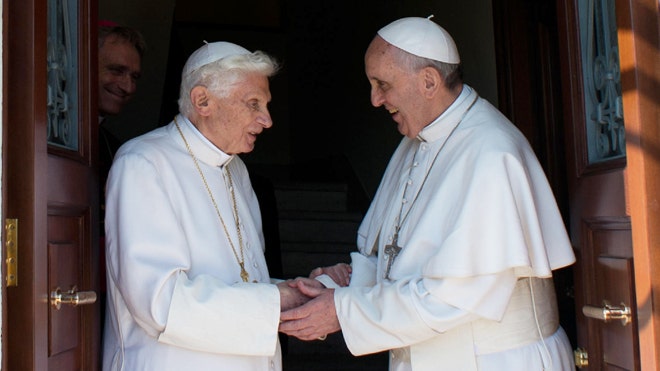Benedict returns to Vatican to live side-by-side with Pope Francis
Published May 02, 2013
Associated Press
Pope Francis welcomed Benedict outside his new retirement home — a converted monastery on the edge of the Vatican gardens — and the two immediately went into the adjoining chapel to pray together, the Vatican said.
The Vatican said Benedict, 86, was pleased to be back and that he would — as he himself has said — "dedicate himself to the service of the church above all with prayer." Francis, the statement said, welcomed him with "brotherly cordiality."
A photo released by the Vatican showed the two men, arms clasped and both smiling, standing inside the doorway of Benedict's new home as Benedict's secretary looks on.
Unlike the live, door-to-door Vatican-provided television coverage that accompanied Benedict's emotional farewell in February, the Vatican provided no television images of his return Thursday.
The low-key approach followed the remarkable yet somewhat alarming images transmitted on March 23 when Francis went to visit Benedict at the papal retreat in Castel Gandolfo, south of Rome, where Benedict was living. In that footage, Benedict appeared visibly more frail and thinner only three weeks after resigning.
Some Vatican officials questioned whether those images should have been released, given how frail Benedict appeared. Thursday's photo showed no obvious signs of further decline.
The Vatican spokesman, the Rev. Federico Lombardi, has acknowledged Benedict's post-retirement decline but has insisted the 86-year-old German isn't suffering from any specific ailment and is just old.
"He is a man who is not young: He is old and his strength is slowly ebbing," Lombardi said this week. "However, there is no special illness. He is an old man who is healthy."
Benedict chose to leave the Vatican immediately after his resignation to physically remove himself from the process of electing his successor and from Pope Francis' first weeks as pontiff.
His absence also gave workers time to finish up renovations on the monastery tucked behind St. Peter's Basilica that until last year housed groups of cloistered nuns who were invited for a few years at a time to live inside the Vatican to pray.
In the compact, four-story building, Benedict will live with his personal secretary, Monsignor Georg Gaenswein, and the four consecrated women who look after him, preparing his meals and tending to the household. The building also has a small library, a study and a guest room for when his brother, Monsignor Georg Ratzinger, comes to visit.
"It is certainly small but well-equipped," Lombardi said.
When Benedict announced his intention to resign — the first pontiff to do so in 600 years — questions immediately swirled about the implications of having two popes living alongside one another inside the Vatican.
Benedict fueled those concerns when he chose to be called "emeritus pope" and "Your Holiness" rather than "emeritus bishop of Rome." He also raised eyebrows when he chose to continue wearing the white cassock of the papacy.
Given the political intrigues that plague the Vatican, it wasn't much of a stretch of the imagination to wonder if some cardinals, bishops and monsignors — not to mention ordinary Catholics — might continue making Benedict their point of reference rather than the new pope.
But Benedict made clear on his final day as pope that he was renouncing the job and pledged his "unconditional reverence and obedience" to his then-unknown successor. It was a pledge he repeated in person on March 23 when Francis went to have lunch with him.
It was during that visit that the world saw how weak Benedict had become: Always a man with a purposeful walk, he shuffled tentatively that day, using his cane.
Francis, for his part, seems utterly unfazed by the novel situation. He has frequently invoked Benedict's name and work and has called him on a half-dozen occasions, making clear he has no intention of ignoring the fact that there's another pope still very much alive and now living on the other side of the garden.
Francis' gestures to Benedict during that March 23 visit were also remarkable: He refused to pray on the special papal kneeler in the small chapel of Castel Gandolfo, preferring to join Benedict on a kneeler in the pews, and referring to his predecessor as his "brother."
Now that they're neighbors, they might bump into one another on walks in the Vatican gardens or at the shrine to the Madonna, which is just a stone's throw from Benedict's new home.


No comments:
Post a Comment